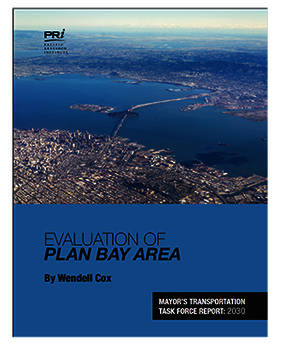Pacific Research Institute Brief Reveals Flaws with San Franciscos Transportation Task Force Report

Today PRI released a brief reviewing San Francisco Mayor Ed Lees Transportation Task Force Report: 2030. The brief is a supplement to PRIs earlier study Plan Bay Area Evaluation (June 2013), which critiqued the plan developed by the Association of Bay Area Governments (ABAG) and the Metropolitan Transportation Commission (MTC). Both the brief and the study were authored by Wendell Cox, a PRI fellow and consultant on public policy, planning, and transportation issues.
Mr. Cox writes, Even if all of the required funding recommended by the Task Force Report is obtained, the San Francisco Municipal Transportation Agency is unlikely to be able to deliver on the promises of the 2030 transportation plan.
Mr. Cox believes that the plan gives little or no attention to the potential for increasing truck and automobile congestion on the citys streets: Street improvement programs will give greater priority to transit, cycling, and walking, and will have a necessary effect of slowing general vehicle travel. Similarly, the implementation of additional exclusive bus lanes and taking of capacity from streets for cycle lanes would likely have the same effect. Traffic congestion retards the productivity of the city by increasing travel times, increasing business costs, higher air pollution, and greater greenhouse gas emissions as vehicles are less fuel efficient at slower speeds and in stop and go conditions.
In addition, Mr. Cox believes that escalating costs will also present difficulties:
1) Most of the costs of the 2030 transportation plan are for capital improvements. In the public sector, capital improvements are inherently susceptible to substantial cost overruns.
2) The Task Force Report indicates little or no commitment to cost effectiveness. Munis costs over the last 15 years have risen far more than inflation. This occurs because there is no competitive influence to keep transit costs under control.
Mr. Cox writes that it seems unlikely that the city would be able to deliver on the expensive capital projects in the 2030 plan without significant strategies to ensure that projects stay on budget. He suggest that the plan might be accomplished through design-build contracts with winning bidders that obligate them to deliver the finished projects within budget, making up for the additional expenses from their own resources. He adds that there are public policy solutions that can bring transit costs under control, which make it possible to maximize service levels for the public and keep fares low — for example, competitive contracts that involve the use of private and public companies to operate individual routes of the transit system for the lowest cost.
Download full report
To learn more about Evaluation Plan Bay Area: Transportation Task Force Report: 2030 or to arrange an interview with author Wendell Cox,, please contact Rowena Itchon ([email protected]) or Laura Dannerbeck ([email protected]) at the Pacific Research Institute.

